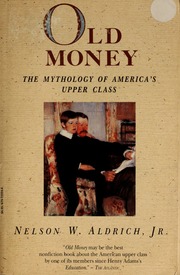
References and Quotes
Nelson W. Aldrich, grandson of Senator Aldrich of Rhode Island, who was one of the principal architectsof the Federal Reserve system, put it this way in his book Old Money: "Membership in this patriciate brought with it much besides wealth, of course: complete domination of all educational and cultural institutions, ownership and control of the news media, exceptionally favored treatment at the hands of political and civic officers, all the legal and fiscal advantages that money and prestige can command, and vast and varied opportunities for further financial gain."[p.32] Direct and indirect domination of the forced schooling mechanism by the patriciate has never been adequately explored, perhaps owing to its ownership of both the tools of research (in the colleges) and the tools of dissemination (in the media).
The great social engineers were confronted by the formidable challenge of working their magic in a democracy, least efficient and most unpredictable of political forms. School was designed to neutralize as much as possible any risk of being blind-sided by the democratic will. Nelson W. Aldrich Jr., writing of his grandfather Senator Aldrich, one of the principal architects of the Federal Reserve System which had come into being while Inglis’ cohort built the schools—and whose intent was much the same, to remove economic machinery from public interference—caught the attitude of the builders perfectly in his book Old Money. Grandfather, he writes, believed that history, evolution, and a saving grace found their best advocates in him and in men like him, in his family and in families like his, down to the close of time. But the price of his privilege, the senator knew, "was vigilance —vigilance, above all, against the resentment of those who never could emerge. "[p.36] Once in Paris, Senator Aldrich saw two men "of the middle or lower class," as he described them, drinking absinthe in a café. That evening back at his hotel he wrote these words: "As I looked upon their dull wild stupor I wondered what dreams were evolved from the depths of the bitter glass. Multiply that scene and you have the possibility of the wildest revolution or the most terrible outrages."[p.36]